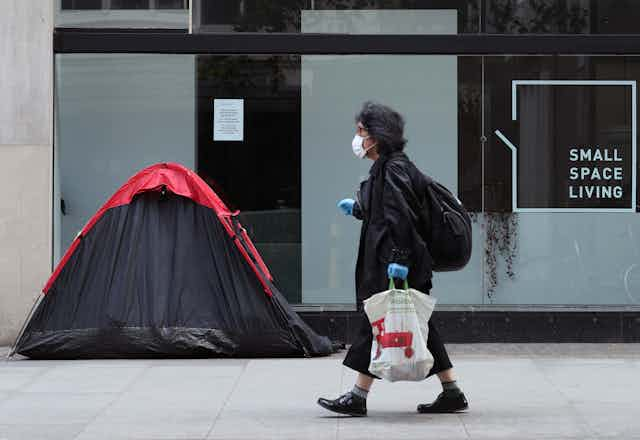Thousands of rough sleepers accommodated in hotels as part of the UK government strategy to control the spread of coronavirus will be moved on as lockdown restrictions ease. The ambition is that people will be moved to alternative accommodation, although how this might be achieved for all remains uncertain.
Public health guidance to “stay home and stay safe” to control the spread of coronavirus shone a sudden and urgent spotlight on the health implications of street homelessness. In response, the government sought to make emergency accommodation available that would allow people sleeping rough or sharing rooms in shelters to self-isolate.
These efforts to bring “everyone in” secured rapid and remarkable reductions in rough sleeping. This is an incredible achievement given that national figures have increased some 165% across the last decade, despite government ambition to bring rough sleeping to an end.
But some people refused to come in and others found the isolation and restriction of living in a hotel room deeply challenging. My recently published research on people’s experiences in hostel accommodation can help us understand why.
The problem with homeless hostels
We know that living in emergency accommodation can have a negative impact on wellbeing, even when it is of a good standard, but particular questions have been raised about one of the staples of temporary housing: the homeless hostel, where people who are homeless live together in a congregate setting.
Public and political opinion will often sway toward the conversion of vacant buildings for use as hostel type accommodation, especially during times of crisis. And we can see similarities in the recent use of vacant hotels for the purpose of accommodating people sleeping rough.
There are differences between hostels and hotels, in building design, staffing and available social supports. But the shared idea is that some shelter is better than no shelter at all. Who wouldn’t want a roof over their head?
Yet the reality is that some people do abandon hostel and hotel places or refuse to “come indoors” at all, choosing to sleep rough or squat instead.
It is sometimes suggested that this is because people are living lives that are too chaotic or have needs that are too complex. Or that some people just prefer to sleep rough for reasons that are puzzling and unfathomable.
But these notions have been challenged. Evidence shows that when given access to a home of their own and support if they want it, people who avoid or abandon shared accommodation are often able and willing to sustain a regular tenancy.

Avoiding hostels
What exactly is it, then, that drives avoidance and abandonment of hostels? Well, firstly, insecurity is woven into their fabric. People can be excluded for periods, evicted without court action, or moved elsewhere.
This means that they must constantly be prepared for a move on to permanent housing while also being braced for a return to the streets. Such anxiety was recently played out on a collective scale in concerns that the funding for emergency hotels might be suddenly withdrawn for people who are homeless.
My latest research was a qualitative study that explored in depth the experiences of eight men living in Belfast, all of whom had a history of repeat hostel accommodation use. It shows that people tried to tolerate uncertainty.
“Sure, if you need a bed, you need a bed”, explained Mark, one of the men I spoke to. And to be clear, people need a bed because they want to avoid the harms of sleeping rough.
The random violence, like the “bad, bad kicking” one of the other men, Sam, got “just for no reason”. The grinding exhaustion Mark felt: “I’m exhausted. I’m fucked. I’m burned out. I am. Still sleeping rough.”
What Mark and Sam wanted was “a quiet life”, one where they could be “settled down and relax”. But as they – and others – explained to me, hostel accommodation was often their only option.
Some had been exploited, victimised, or threatened in hostels. Hostel living was time and again described as causing acute feelings of vulnerability, exposure and unease. “You’re always on edge,” explained Kyle, another of my interviewees. “You’re always, constantly, on guard.”
Hostels vary considerably. I found that these feelings of unease were most intolerable in services where people lacked control over their own living space. When they had no choice over where they stayed, who they stayed with, and limited say in the rules and routines they had to comply with.
Here, avoiding hostels altogether was a reasoned and rational response to intolerable stress, and one that represented an attempt to prioritise wellbeing, particularly where hostels posed greater risks than sleeping rough.
Back to normal?
As hotels revert to business as usual and emergency provisions for the purpose of self isolation are gradually brought to an end, the concern is that we will see returns to rough sleeping and shelter use or increases in the number of hostel spaces.
These concerns are valid. Government calls to bring “everyone in” were always caveated with the need to identify “step-down arrangements for the future, including the re-opening of shelter-type accommodation”.
The temptation is to argue for the benefits of hostels, hotels and similar, on the basis that they are better than no accommodation at all. But in the midst of this crisis we must somehow account for the experiences of those who avoid and abandon these forms of accommodation because they find them less tolerable than sleeping rough.
This phenomenon is not a puzzling and unfathomable occurrence, or an anomaly driven only by individual pathology. It is an outcome of a system that renders unsuitable accommodation acceptable.
Evidence shows that enabling people who are sleeping rough to access a settled home of their own with access to support if they want it, works. If everyone is to be “brought in” for good, this must be our ambition.

